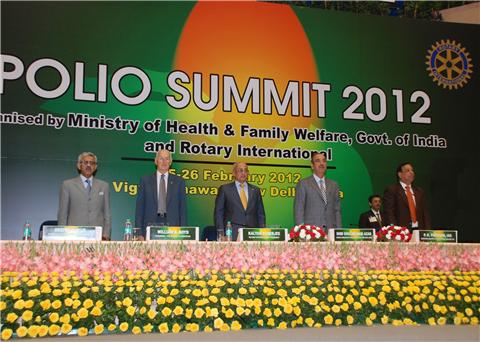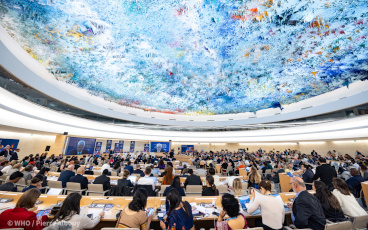Three to Go..
It´s official: India is no longer polio-endemic, leaving just three countries which have never stopped polio

1 March 2012 – It was a much-anticipated moment. Weeks after India marked 12 months in which no Indian child had been paralyzed by polio, the World Health Organization notified the national authorities on 25 February that India was officially removed from the list of countries with active transmission of endemic polio. India’s success leaves only three countries remaining polio-endemic – meaning they have never stopped indigenous wild poliovirus transmission: Afghanistan, Nigeria and Pakistan.
As samples from the past year cleared laboratory tests with no sign of wild poliovirus, the data published by WHO today shows – for the first time in history – that there is no polio in India.
The official announcement was made last weekend at the Polio Summit 2012 in New Delhi. A letter written by WHO Director-General Dr Margaret Chan and delivered to the Indian Government on the morning of the Polio Summit confirmed the news.
Prime Minister Manmohan Singh confirmed India´s commitment to continuing to protect its children from possible re-importations of the poliovirus and to strengthening its routine immunization programme. The Prime Minister noted that India´s success proved the viability of global polio eradication: “This gives us hope that we can finally eradicate polio not only from India but from the face of the entire mother earth.”
Amidst thundering applause and a standing ovation by the 1400-plus participants from across the world, India’s Health Minister, Ghulam Nabi Azad, said: “We have won the battle but the war is not yet over. Let us today rededicate ourselves and resolve that we will continue our efforts with the same vigour, so that India can be declared (certified) polio-free by 2014.”
The Prime Minister said that the success of India’s efforts was proof that teamwork pays, adding that the Union and State Governments have worked in close partnership with many community, national and international organizations and partners including Rotary International, World Health Organization, UNICEF and the US Centers for Disease Control and Prevention to eradicate polio.
“The real credit goes to the 2.3 million volunteers who repeatedly vaccinated children even in the most remote areas, often in very bad weather conditions,” the Prime Minister said. “I commend each one of them for their dedication, commitment and selfless service.”
Mr Azad said that since its launch in 1995, the polio eradication programme had made a tremendous effort to reach virtually every child in India. In recent years, as a result, the coverage in polio immunization rounds in the two traditionally endemic states – Uttar Pradesh and Bihar – had crossed 99 per cent. “This level of coverage is unprecedented – not witnessed anywhere in the world on such a large scale,” he said.
Mr Azad attributed the milestone to the strong will and determination of the Government, which ensured there was never any shortage of resources or funds for the programme, the willingness to introduce innovations that delivered rich dividends, the unprecedented scale of the effort to reach every last child, and the preparedness to launch aggressive responses to wild poliovirus cases. The Minister also recognized the tireless efforts of the frontline workers and the patient faith reposed by parents of 174 million children in the polio programme to secure the health of their children.
The Health Minister lauded the strong and effective polio partnership – with Rotary International at the forefront of espousing polio eradication, WHO setting new standards in surveillance and UNICEF helping prove that it is possible to overcome fears and resistance with highly imaginative communication and advocacy strategies.
However, the Minister said the Indian Government was “acutely aware” that it could not drop its guard. “We are excited and hopeful, at the same time, vigilant and alert. We are highly mindful of the risks that persist, not only on account of residual indigenous transmission but also from other countries.”
Stressing that “there is no room for complacency”, Mr Azad said the programme needs to continue with “full force” until polio was eradicated globally.
The two-day Polio Summit was organised by Rotary International in conjunction with the Government of India to commemorate India’s trailblazing effort, focus on the remaining risks and determine the way forward. The Union Ministers of State for Health and Family Welfare, Mr Sudip Bandyopadhyay and Mr S Gandhiselvan; Rotary International President Mr Kalyan Banerjee and The Rotary Foundation Chairman Mr. William Boyd joined senior health officials from Pakistan, Nigeria, Sri Lanka and Nepal, various Indian states, Principal Secretaries, Mission Directors of the National Rural Health Mission, State Immunization Officers, heads and representatives of key partner organisations, together with representatives of the huge polio workforce – the frontline workers, medical officers and community mobilisers, at the Summit.
The Summit deliberated on how to build synergies to ensure that the present momentum against polio is maintained until the disease is eradicated. It provided a platform for all the key players in the end game strategy for polio eradication – government, partners, donors and frontline workers – to renew and reinforce their commitment to eradicate polio in India.













